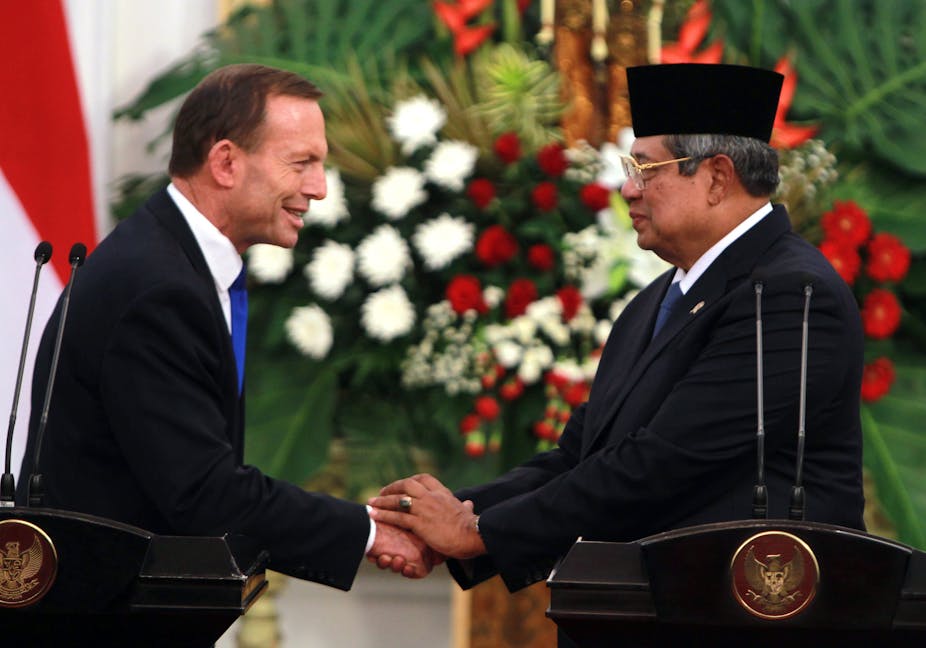The revelations that Australia was spying on its “best friends” in Indonesia have rocked Indonesia-Australia relations. Indonesian foreign minister Marty Natalegawa has withdrawn the country’s ambassador from Canberra and suggested he may not be back anytime soon.
Leaked documents from the US National Security Agency show Australian intelligence tapped Indonesian president Susilo Bambang Yudhoyono’s (SBY) mobile phone for 15 days in August 2009. It is well-known that SBY is more favourably disposed towards Canberra than any of his predecessors, so it remains unclear what – if any – lasting effect this revelation will have on SBY’s outlook towards Australia.
The Indonesian president took to Twitter, saying:
I also deeply regret that the Australian prime minister sees the phone tapping of Indonesia as paltry, without any feeling of being in the wrong.
This is not simply a bit of “gestural politics” which some commentators are writing it off as. Reports from Jakarta suggest Indonesia may be moving to review all aspects of its relationship to Australia.
Also spied on, Vice President Boediono has degrees and now honorary degrees from the University of Western Australia, Monash and ANU and has publicly said that his career and his moral compass were shaped by his time in Australia.
Sri Mulyani, Indonesia’s former finance minister, is a particularly strange target for spying – unless we were trying to work out the secrets of Indonesia’s astounding growth-rate. With a PhD from the University of Illinois, Mulyani was largely apolitical until her appointment to the Yudhoyono cabinet in 2005. However, she resigned in 2010, mostly because of the machinations of a group of corrupt but politically well-connected businessmen.
Mulyani was immediately appointed as one of three managing directors at the World Bank. By 2009, when the spying supposedly started, anyone with knowledge of Indonesian domestic politics would have known of her impending political demise.
Even less defensible in the eyes of the Indonesian public is the Australian eavesdropping on the First Lady, Kristiani (better known as Ibu Ani Yudhoyono). While she is the daughter of General Sarwo Edhie, she is arguably the least political of the “first spouses” in the history of Indonesia.
Australian prime minister Tony Abbott’s comment that passed off the intelligence activities as “information gathering” rather than spying will be, at best, fodder for Indonesian cartoonists. At worst, it will be seen as adding insult to injury.
Equally pointless is the expert commentary that all governments spy and that the Indonesian political leaders are merely staging outrage for the benefit of its domestic audience.
This distinction between “domestic” and “foreign” is simply not that clear cut in the 21st century when the national boundaries no longer operate as barriers for news distribution. And the Indonesian leadership knows not to stoke any anti-foreign sentiments without serious consideration.
So far, the coverage in the Indonesian press has been balanced and sober, giving substantial space to Australian government responses. Kompas, Indonesia’s most respected daily, even points out that the phone taps were authorised not by the Coalition government but by its predecessor.
Other Indonesian newspapers have pointed out that some of the Australian spying targets might themselves be running for office in the impending elections. Only time will tell how those individuals might deal with the experience of their privacy being invaded.
The last time Jakarta withdrew its ambassador was in 2006, when the then-Howard government gave political asylum to 43 West Papuans in Australia. On that occasion, the actions of both governments divided opinion in both nations. Substantial sections of the media and politicians in both countries – including a small group of Liberal parliamentarians – argued that it was right and proper for the Papuans to seek asylum and it was right and proper for a democracy such as Australia to provide such asylum.
This time, the Indonesian population is broadly against Australia’s actions. The mood is somewhere between outrage, cynicism or at best disinterest, after almost constant public stoushes between the two nations in the last few months.
Nor is the issue of Australia-Indonesia relations high on the list of concerns for the most popular potential presidential candidates. None of the three – Jakarta governor Jokowi, retired general Prabowo and media magnate Dahlan Iskan – have expressed any views on the spying fiasco publicly.
The Australian media is certainly focused on Indonesia now. However, this is probably not what Tony Abbott meant when he suggested that the Coalition government’s foreign policy would pivot from Geneva to Jakarta.
In Perth last week, Boediono addressed a small group of young Australians who are studying Indonesian language and culture. He said:
By learning our language and culture, you will have the key to our hearts. And therein is the best way for us to learn about each other.
It would be so much better if Australia could understand what our neighbours are saying out loud, rather than having to eavesdrop.

